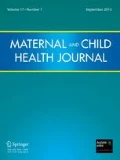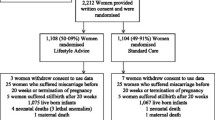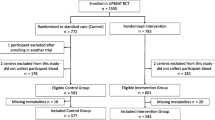Abstract
Obese pregnant women are the focus of numerous dietary and lifestyle intervention studies, however there is a paucity of literature examining the habitual dietary and lifestyle habits of this population. This paper aims to assess maternal dietary and lifestyle habits in an obese cohort, in order to identify priority areas to be addressed in future studies and in clinical practice. This prospective observational study recruited 100 pregnant women with a body mass index 30.0–39.9 kg/m2 from routine antenatal clinics. Dietary intakes were assessed using a 3-day food diary and a structured lifestyle questionnaire assessed physical activity levels, smoking and alcohol habits and wellbeing. Macronutrient intakes as a percentage of total energy were not compliant to healthy eating guidelines with an inadequate intake of carbohydrate and excess intake of saturated fat. Compliance to recommended intakes of calcium, iron, folate and vitamin D was poor from diet alone. The consumption of energy dense food groups high in fat and sugar was greater than for published pregnant populations and the general female non-pregnant population. One-third of women reported engaging in weekly physical activity that would comply with recommendations for pregnant women while 25 % reported low mood status indicating potential depression. High intakes of energy-dense processed foods and poor compliance to micronutrient recommendations are critical dietary issues of concern among obese pregnant women. Low mood is a barrier to motivation for changing behaviour which would also need to be addressed in future lifestyle intervention studies.
Similar content being viewed by others
References
Guelinckx, I., Devlieger, R., Beckers, K., & Vansant, G. (2008). Maternal obesity: Pregnancy complications, gestational weight gain and nutrition. Obesity Reviews, 9, 140–150.
Huda, S. S., Brodie, L. E., & Sattar, N. (2010). Obesity in pregnancy: Prevalence and metabolic consequences. Seminars in Fetal and Neonatal Medicine, 15, 70–76.
Drake, A. J., & Reynolds, R. M. (2010). Impact of maternal obesity on offspring obesity and cardiometabolic disease risk. Reproduction, 140, 387–398.
Heerwagen, M. J. R., Miller, M. R., Barbour, L. A., & Friedman, J. E. (2010). Maternal obesity and fetal metabolic programming: A fertile epigenetic soil. American Journal of Physiology-Regulatory, Integrative and Comparative Physiology, 299, R711–R722.
Dowling, D., & McAuliffe, F. M. (2013). The molecular mechanisms of offspring effects from obese pregnancy. Obesity Facts, 6(2), 134–145.
Tanentsapf, I., Heitmann, B. L., & Adegboye, A. R. A. (2011). Systematic review of clinical trials on dietary interventions to prevent excessive weight gain during pregnancy among, abnormal weight, overweight and obese women. BMC Pregnancy Childbirth, 11(81), 1–12.
Thangaratinam, S., Rogozinska, E., Jolly, K., Glinkowski, S., Roseboom, T., Tomlinson, J. W., et al. (2012). Effects of interventions in pregnancy on maternal weight and obstetric outcomes. BMJ, 344, e2088.
Wolff, S., Legarth, J., Vansgaard, K., Toubro, S., & Astrup, A. (2008). A randomized trial of the effects of dietary counselling on gestational weight gain and glucose metabolism in obese pregnant women. International Journal of Obesity, 32, 495–501.
Guelinckx, I., Devlieger, R., Mullie, P., & Vansant, G. (2010). Effect of lifestyle intervention on dietary habits, physical activity and gestational weight gain in obese pregnant women: A randomized controlled trial. American Journal of Clinical Nutrition, 91, 373–380.
Blumfield, M. L., Hure, A. J., Macdonald-Wicks, L., Smith, R., & Collins, C. E. (2012). Systematic review and meta-analysis of energy and macronutrient intakes during pregnancy in developed countries. Nutrition Reviews, 70(6), 322–336.
Blumfield, M. L., Hure, A. J., Macdonald-Wicks, L., Smith, R., & Collins, C. E. (2013). Micronutrient intakes during pregnancy in developed countries: A meta-analysis. Nutrition Reviews, 71, 118–132.
Moran, L. J., Sui, Z., Cramp, C. S., & Dodd, J. M. (2012). A decrease in diet quality occurs during pregnancy in overweight and obese women which is maintained post-partum. International Journal of Obesity, 37(5), 704–711.
Rodríguez-Bernal, C. L., Ramón, R., Quiles, J., Murcia, M., Navarette-Muñoz, E. M., Vioque, J., et al. (2012). Dietary intake in pregnant women in a Spanish Mediterranean area: As good as it is supposed to be? Public Health Nutrition, 16(8), 1379–1389.
Food Standards Agency. (2002). McCance and widdowson’s. In The composition of foods, (sixth summary edition. Cambridge: Royal Society of Chemistry.
Irish Universities Nutrition Alliance. (2011). National adult nutrition survey, summary report. (Walton J, Ed.). IUNA http://www.iuna.net/wp-content/uploads/2010/12/National-Adult-Nutrition-Survey-Summary-Report-March-2011.pdf.
Health Promotion Policy Unit. (1987).Guidelines for preparing information and advice to the general public on healthy eating. Dublin: Department of Health and Children.
Report on Health and Social Subjects 41 Dietary reference values (DRVs) for food energy and nutrients for the UK, Report of the Panel on DRVs of the Committee on Medical Aspects of Food Policy (COMA). (1991). The Stationary Office. London.
Food Safety Authority of Ireland. (1999). Recommended dietary allowances for Ireland. Dublin: FSAI.
Wearne, S. J., & Day, M. J. L. (1999). Clues for the development of food-based dietary guidelines: How are dietary targets being achieved by UK consumers? British Journal of Nutrition, 81, S119–S126.
Henry, C. J. K. (2005). Basal metabolic rate studies in humans: Measurement and development of new equations. Public Health Nutrition, 8, 1133–1152.
Goldberg, G. R., Black, A. E., Jebb, S. A., Cole, T. J., Murgatroyd, P. R., Coward, W. A., et al. (1991). Critical evaluation of energy intake data using fundamental principles of energy physiology: 1. Derivation of cut-off limits to identify under-recording. European Journal of Clinical Nutrition, 45, 569–581.
Derbyshire, E., Davies, G. J., Costarelli, V., & Dettmar, P. W. (2009). Habitual micronutrient intake during and after pregnancy in Caucasian Londoners. Maternal and Child Nutrition, 5, 1–9.
McGowan, C. A., & McAuliffe, F. M. (2012). Maternal nutrient intakes and levels of energy under reporting during early pregnancy. European Journal of Clinical Nutrition, 66, 906–913.
Ward M, McGee H, Morgan K, Van Lente E, Layte R, Barry M, et al. SLÁN. (2007). Survey of lifestyle, attitudes and nutrition in Ireland. ‘One Island—One Lifestyle?’ Health and lifestyles in the Republic of Ireland and Northern Ireland: Comparing the population surveys SLÁN 2007 and NIHSWS 2005. Published 2009. http://www.drugsandalcohol.ie/12449/1/slan_oneisland.pdf.
ACOG Committee Obstetric Practice. (2002). ACOG Committee Opinion No. 267, January 2002 (Reaffirmed 2009): Exercise during pregnancy and the postpartum period. Obstetrics and Gynecology, 99, 171–173.
Bech, P., Olsen, L. R., Kjoller, M., & Rasmussen, M. K. (2003). Measuring wellbeing rather than the absence of distress symptoms: A comparison of the SF-36 Mental Health subscale and the WHO-5 well-being scale. International Journal of Methods in Psychiatric Research, 12, 85–91.
Institute of Medicine. (2009). Weight gain during pregnancy: Re-examining the guidelines. National Academies Press.
Henkel, V., Mergl, R., Kohnen, R., Maier, W., Möller, H.-J., & Hegerl, U. (2003). Identifying depression in primary care: A comparison of different methods in a prospective cohort study. BMJ, 326, 200–201.
McGowan, C. A., & McAuliffe, F. M. (2012). Maternal dietary patterns and associated nutrient intakes during each trimester of pregnancy. Public Health Nutrition, 16, 97–107.
Crozier, S. R., Robinson, S. M., Borland, S. E., & Inskip, H. M. (2006). Dietary patterns in the Southampton Women’s Study. European Journal of Clinical Nutrition, 60, 1391–1399.
Northstone, K., Emmett, P. M., & Rogers, I. (2008). Dietary patterns in pregnancy and associations with nutrient intakes. British Journal of Nutrition, 99, 406–415.
Rasmussen, S. A., Chu, S. Y., Kim, S. Y., Schmid, C. H., & Lau, J. (2008). Maternal obesity and risk of neural tube defects: A meta-analysis. American Journal of Obstetrics and Gynecology, 198, 611–619.
De-Regil, L. M., Fernández-Gaxiola, A. C., Dowswell, T., & Peña-Rosas, J. P. (2010). Effects and safety of periconceptional folate supplementation for preventing birth defects. The Cochrane Database of Systematic Reviews, 6, CD007950.
McNulty, B., Pentieva, K., Marshall, B., Ward, M., Molloy, A. M., Scot, J. M., et al. (2011). Women’s compliance with current folic acid recommendations and achievement of optimal vitamin status for preventing neural tube defects. Human Reproduction, 26, 1530–1536.
Walsh, J. M., McGowan, C., Byrne, J., & McAuliffe, F. M. (2011). Prevalence of physical activity among healthy pregnant women in Ireland. International Journal of Gynecology and Obstetrics, 114, 154–155.
Amezcua-Prieto, C., Lardelli-Claret, P., Olmedo-Requena, R., Mozas-Moreno, J., Bueno-Cavanillas, A., & Jiminez-Moleon, J. J. (2011). Compliance with leisure time physical activity recommendations in pregnant women. Acta Obstetricia et Gynecologica Scandinavica, 90, 245–252.
Lichtman, S. W., Pisarska, K., Berman, E. R., Pestone, M., Dowling, H., Offenbacher, E., et al. (1992). Discrepancy between self-reported and actual caloric intake and exercise in obese subjects. New England Journal of Medicine, 327, 1893–1898.
Flick, A. A., Brookfield, K. F., de la Torre, L., Tudela, C. M., Duthely, L., & Gonzalez-Quintero, V. H. (2010). Excessive weight gain among obese women and pregnancy outcomes. American Journal of Perinatology, 27, 333–338.
Acknowledgments
The authors would like to thank all participants in the study for their generous contribution of time. This work was funded by the National Maternity Hospital Research Fund.
Conflict of interest
The authors declare that they have no conflict of interest.
Author information
Authors and Affiliations
Corresponding author
Rights and permissions
About this article
Cite this article
Lindsay, K.L., Heneghan, C., McNulty, B. et al. Lifestyle and Dietary Habits of an Obese Pregnant Cohort. Matern Child Health J 19, 25–32 (2015). https://doi.org/10.1007/s10995-014-1491-2
Published:
Issue Date:
DOI: https://doi.org/10.1007/s10995-014-1491-2




